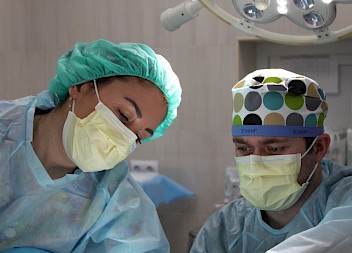This year we also won the case of a woman who suffered bowel perforation during a hysterectomy and for which she was awarded £125,000 in compensation.
Woman Not Informed of Risks of Hysterectomy Awarded £125,000 Damages Seven Years After Suffering Bowel Complications
Choosing to forego fertility by having their uterus removed is not an easy decision for a woman to make. However, for our client, she should have had alternative treatment (endometrial ablation) which would have prevented long-term bowel problems that resulted from her hysterectomy.
During her preoperative laparoscopy five months before the hysterectomy, the examination failed to identify severe scar tissue in the pelvis. Our client has long suffered with the inflammatory bowel condition, ulcerative colitis. Yet she was not told she would have an increased risk of bowel perforation during the procedure, neither was she advised to have womb ablation which breaks down the womb lining without the need for invasive surgery.
Due to the perforation of the bowel, she underwent a Hartmann’s operation which led to her needing a stoma fitting. This was reversed seven months later but led to bowel incontinence, an incisional hernia and stoma site pain and scarring. She is also at future risk of developing further hernias and bowel obstruction.
The complications that arose from surgery led our client to have a substantial absence from work, resulting in her taking voluntary redundancy in 2017. Her mental health was also seriously affected. She began to self-harm and was diagnosed as having chronic adjustment disorder which needed treatment.
She approached Medical Solicitors 16 months after the limitation period had expired, however, we recognised her case had good merit and so agreed to take it on. Liability and causation had been denied by the defendant, Pennine Acute Hospitals Trust. They argued our client’s chronic bowel condition had caused the continence issues and that her scar tissue had worsened in the five months between laparoscopy and hysterectomy; the latter was dismissed by gynaecological experts who also agreed the extent of the adhesions should have been identified during the preoperative assessment.
These failures, amounting to medical negligence, led to our client suffering bowel injury during her hysterectomy and she had to later have stoma reversal surgery. She also suffered from acute depression which meant she only consulted out firm one year after the usual 3-year time limit for bringing a claim. A settlement of £125,000 was agreed in May 2020, seven years after the injury.









